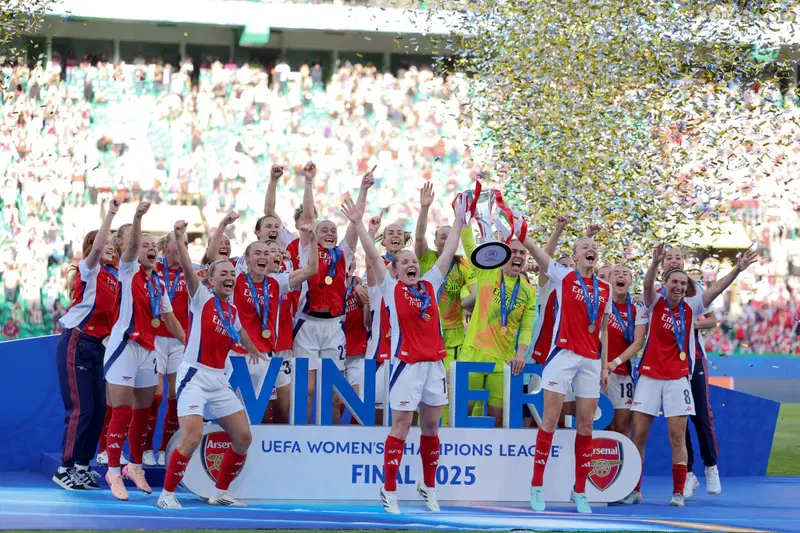The UEFA Women’s Champions League final in Lisbon witnessed a monumental upset as Arsenal Women defied expectations to dethrone reigning champions Barcelona, claiming their second European title with a hard-fought 1-0 victory. This marked Arsenal’s return to the final stage after a 16-year hiatus, their previous triumph dating back to 2007. Against a Barcelona side boasting three titles in the past four seasons and a squad brimming with Ballon d’Or winners, Arsenal’s victory was a testament to their resilience, tactical acumen, and unwavering belief.
The match unfolded under the intense Lisbon sun, with Barcelona initially dominating possession and probing for openings. Arsenal, however, displayed remarkable defensive solidity, effectively neutralizing the threat posed by the likes of Aitana Bonmati and Alexia Putellas. Goalkeeper Daphne van Domselaar, brought back into the starting line-up, proved instrumental in thwarting early Barcelona advances, scrambling to clear dangerous crosses and maintaining a clean sheet. Arsenal, far from being passive, created opportunities of their own, with Frida Maanum coming close and Kim Little narrowly missing the target. A disallowed goal for offside momentarily dampened Arsenal’s spirits but simultaneously seemed to inject a renewed sense of urgency and belief into their play.
The first half was a tactical battleground. While Barcelona, spearheaded by two-time Ballon d’Or winner Alexia Putellas, controlled possession, Arsenal held their own. Their defensive organization, anchored by the exemplary Leah Williamson, proved a formidable barrier against the Catalan giants. Arsenal’s midfield, led by veteran Kim Little, disrupted Barcelona’s passing flow, denying them their usual rhythm and creating a surprisingly even contest. The first half concluded goalless, leaving the outcome hanging in the balance.
Barcelona emerged from the break with increased intensity, their attacking prowess finally starting to penetrate Arsenal’s defenses. A deflected shot from leading scorer Asisat Oshoala struck the crossbar, a warning sign of the threat they posed. Ona Batlle, a constant threat down the flank, came close with a narrowly missed effort. Van Domselaar again proved crucial, denying Bonmati at the near post as Barcelona shifted into a higher gear. Despite the mounting pressure, Arsenal’s defense remained resolute, repelling wave after wave of Barcelona attacks.
The turning point arrived midway through the second half. Capitalizing on a rare lapse in Barcelona’s defense, substitute Stina Blackstenius found herself one-on-one with Barcelona goalkeeper Cata Coll, only to be denied by a brilliant save. This missed opportunity, however, served as a prelude to the decisive moment. Minutes later, another substitute, Beth Mead, played a perfectly weighted reverse pass to Blackstenius, who coolly slotted the ball through Ona Batlle’s legs and into the bottom corner, giving Arsenal a shock lead in the 74th minute.
The final 15 minutes were a tense affair. Barcelona, known for their late-game heroics, threw everything forward in search of an equalizer. Arsenal, however, held firm, their defense holding strong against the relentless Barcelona pressure. The anticipated onslaught never materialized as Arsenal expertly managed the game, disrupting Barcelona’s flow and defending with discipline and determination. The final whistle confirmed a historic victory for Arsenal, their second Champions League title and a testament to their resilience and tactical masterclass against the European powerhouses.
This triumph held special significance for Arsenal, marking a remarkable turnaround under manager Jonas Eidevall. After narrowly missing out on the Women’s Super League title, the Champions League victory provided a sweet culmination to their season, a testament to their growth and development as a team. It also sent a powerful message to the footballing world, signaling Arsenal’s resurgence as a force to be reckoned with on the European stage. The victory was a culmination of years of hard work and investment in the women’s game, signifying Arsenal’s commitment to competing at the highest level. Defeating Barcelona, a team that has set the benchmark for women’s football in recent years, made the achievement even more remarkable. This victory resonates not just as a triumph for Arsenal but also for the women’s game as a whole, showcasing the increasing competitiveness and quality of the sport.


